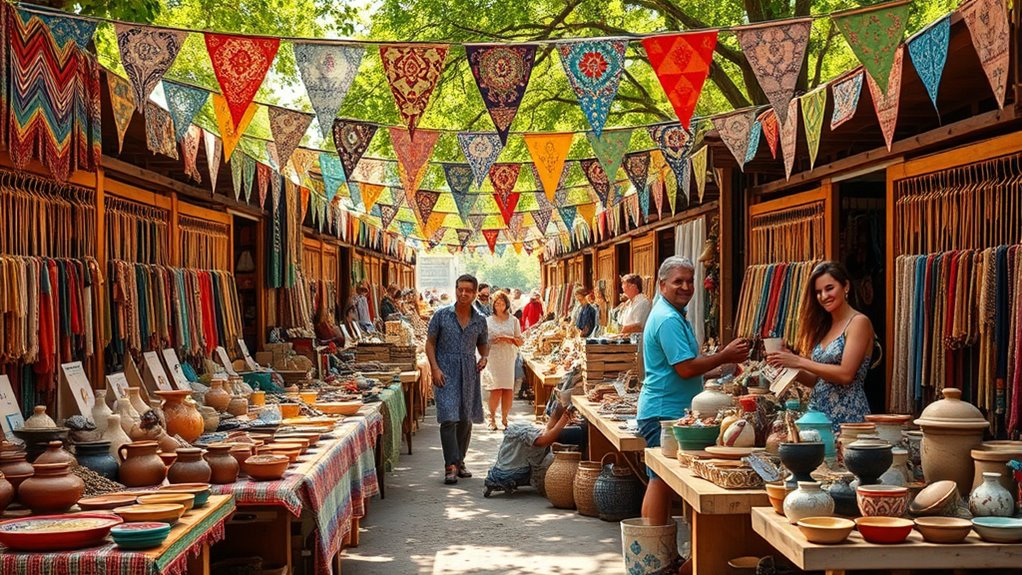Supporting artisans and fair trade in the boho community helps you access unique, handcrafted items that celebrate cultural traditions and sustainable practices. By choosing ethically sourced products made by small-scale producers, you promote fair wages, environmental conservation, and cultural preservation. These markets foster genuine connections with artisans and promote inclusivity. If you continue exploring, you’ll discover how your choices can make a real difference in creating a more responsible and vibrant marketplace.
Key Takeaways
- Artisans create unique, handcrafted products that celebrate cultural traditions and promote sustainability within the boho community.
- Fair trade practices ensure fair wages, ethical sourcing, and support for small producers globally.
- Ethical markets prioritize eco-friendly materials, transparent supply chains, and environmentally conscious production methods.
- Connecting consumers with artisans fosters cultural exchange and helps preserve traditional craftsmanship.
- Inclusive marketplaces promote social equity, support marginalized artisans, and uphold fair labor standards.
The Role of Artisans in the Boho Community
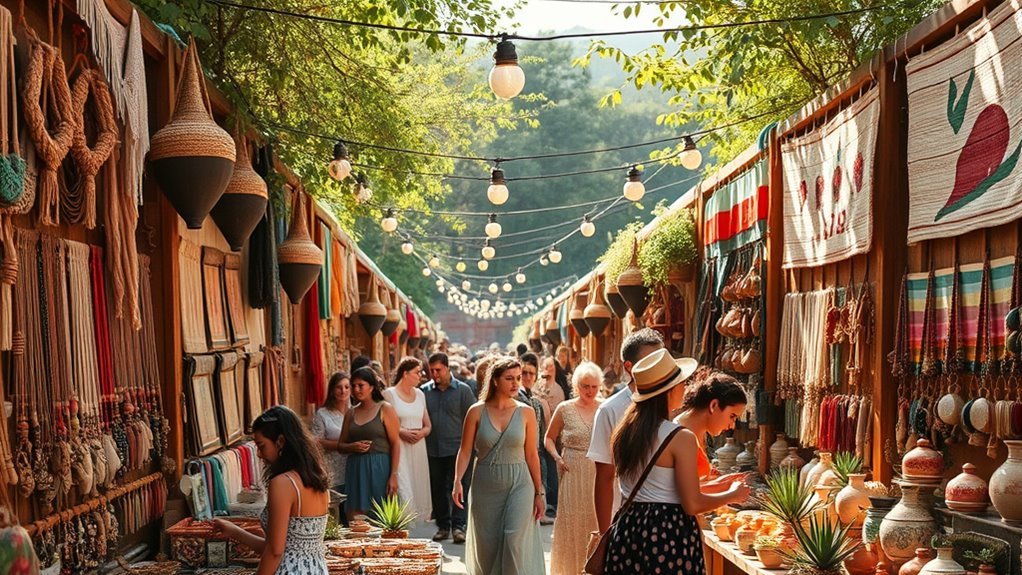
Artisans play a pivotal role in shaping the boho community by creating unique, handcrafted products that celebrate cultural traditions and sustainable practices. They often collaborate with fair trade organizations to guarantee their work is ethically sourced and fairly compensated. By doing so, they help promote equitable economic growth and preserve regional craftsmanship. Your support of artisan-made goods like jewelry, textiles, and home decor not only celebrates diverse cultural skills but also encourages sustainable development. Many artisans sell their creations through local markets and online platforms, connecting directly with consumers like you. Supporting these artisans ensures traditional techniques are kept alive, fosters cultural diversity, and aligns with the values of the boho community—authenticity, sustainability, and ethical practices.
Promoting Ethical and Sustainable Practices in Markets
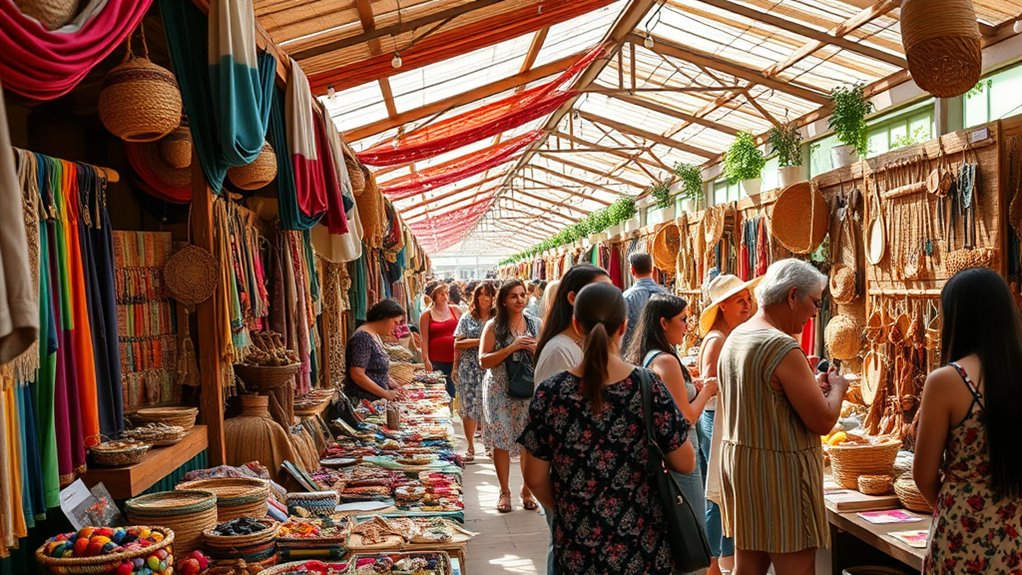
Promoting ethical and sustainable practices in markets guarantees that consumers can support products that uphold social and environmental responsibility. When you choose items with a focus on ethical sourcing, you’re helping small-scale artisans and fair trade organizations receive fair wages and work in humane conditions. Sustainable marketplaces often feature eco-friendly materials, like recycled fibers or natural fabrics, and prioritize environmentally conscious production methods. Transparent supply chains and certifications, such as those from the Fair Trade Federation, empower you to make informed choices aligned with your values. By supporting these practices, you’re not only preserving cultural traditions through handcrafted goods but also contributing to community development, poverty alleviation, and environmental conservation worldwide. Your purchasing decisions can drive positive change in the marketplace. Incorporating mindful decluttering strategies ensures that your support is meaningful and aligns with your commitment to sustainability. Additionally, choosing products with certifications helps verify their adherence to ethical standards, further promoting responsible consumption. Recognizing the importance of ethical hacking principles in transparency can help consumers better understand supply chain vulnerabilities and advocate for stronger protections within fair trade networks. Emphasizing traceability in supply chains enhances accountability and ensures ethical practices are maintained throughout the production process.
How Fair Trade Empowers Small-Scale Producers
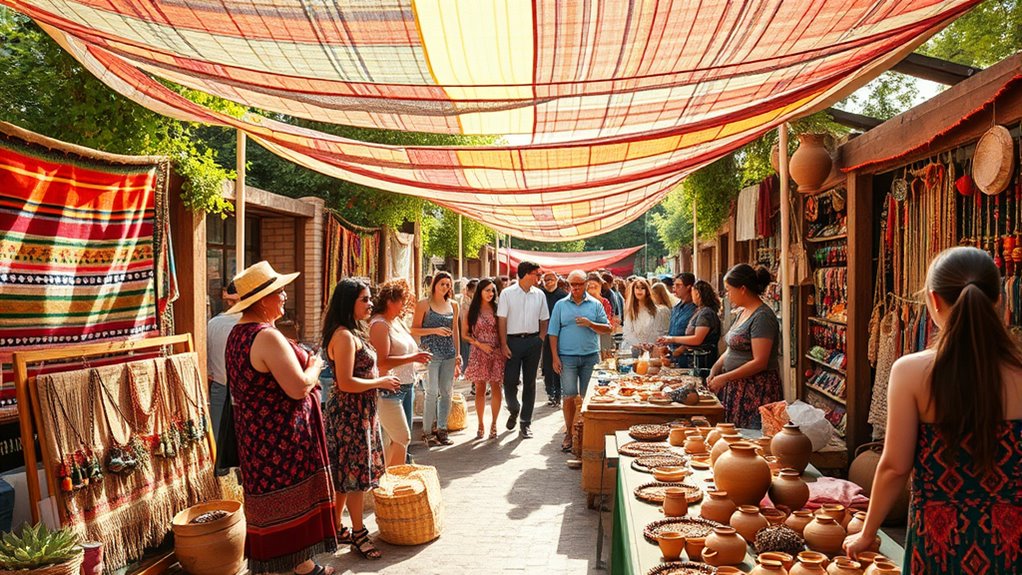
Fair Trade plays a crucial role in empowering small-scale producers by ensuring they receive fair wages and work under humane conditions. When you choose ethically sourced products, you’re supporting artisans and farmers who earn premiums for community development projects, improving their quality of life. Fair Trade certification helps these producers access global markets, boosting their income and economic stability. It also promotes sustainable farming and artisan practices by encouraging environmentally friendly methods, ensuring their work preserves natural resources. The model emphasizes transparency and trust, allowing you to trace products back to their ethical origins. By supporting Fair Trade, you’re helping small producers not only sustain their livelihoods but also preserve cultural traditions and invest in essential community infrastructure.
Connecting Consumers With Cultural Craftsmanship
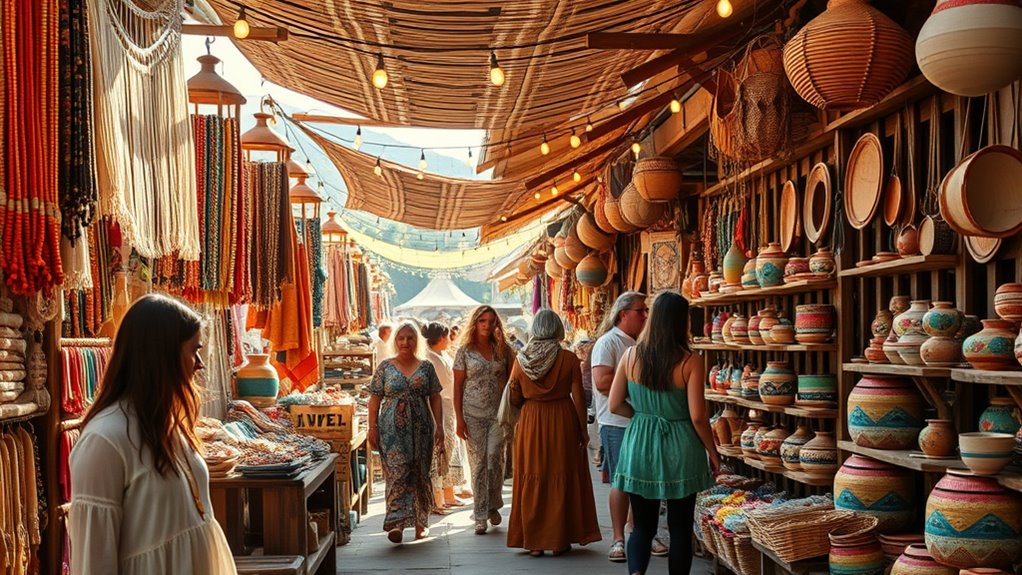
Connecting with cultural craftsmanship allows you to experience the rich traditions and skills behind handcrafted goods from around the world. When you make just one purchase through fair trade marketplaces, you directly support artisans from regions like Guatemala, India, and Africa, showcasing their unique techniques. These platforms highlight the cultural significance behind each piece, helping you appreciate the craftsmanship and stories woven into every item. Ethical sourcing guarantees artisans receive fair wages and that their communities benefit sustainably. By connecting with artisans directly—often through transparent communication—you foster genuine relationships and cultural exchange. Your one purchase becomes more than a transaction; it becomes a way to preserve traditional skills and support artisans in their craft, making a meaningful impact worldwide. Cultural craftsmanship enriches our understanding of diverse artistic heritages and promotes sustainable development. Additionally, many marketplaces emphasize the importance of authentic materials, ensuring that each product reflects its cultural origins and supports environmentally responsible practices. Incorporating herbal teas into your routine can further deepen your appreciation for traditional practices and holistic well-being.
Building a Responsible and Inclusive Marketplace
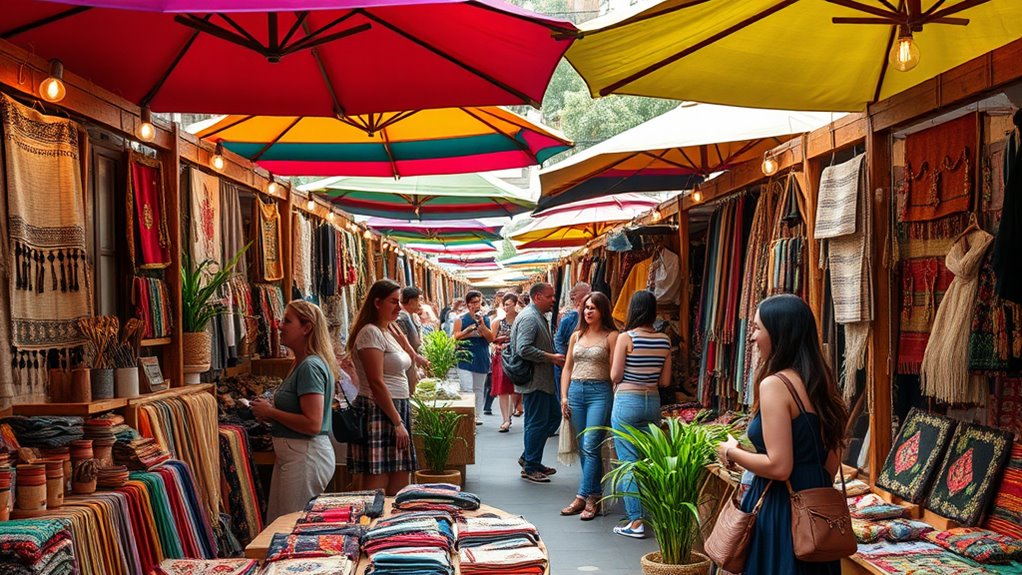
How can marketplaces create a space that truly values fairness and inclusivity? By prioritizing fair trade practices, you guarantee artisans from diverse backgrounds receive fair pay and recognition. Promoting ethical sourcing, transparency, and sustainability supports their well-being and community growth. This approach helps marginalized groups and artisans with limited access to traditional channels find opportunities. Implementing policies that prevent exploitative labor and focus on products adhering to social and environmental standards is crucial. Building such a marketplace demands ongoing education, active community engagement, and strategic partnerships that champion social justice and cultural diversity. Understanding the store hours of various beauty retailers can also facilitate better community engagement and support for local artisans. Incorporating ethical sourcing practices with a focus on social and environmental standards ensures that artisans are empowered and their work valued. Additionally, fostering cultural diversity within the marketplace promotes a richer and more inclusive environment. Recognizing the importance of fair trade principles can further strengthen trust and integrity in the marketplace. Regular monitoring and adjusting of production processes in line with production quantity variance can help ensure fair working conditions and proper resource allocation. Your efforts foster an environment where artisans feel valued, and consumers can confidently support products crafted responsibly. Ultimately, a responsible and inclusive marketplace benefits everyone, creating a more equitable and sustainable community.
Frequently Asked Questions
How Much Does It Cost to Be a Vendor at the Boho Market?
You want to know the cost to be a vendor at the Boho Market. Typically, booth fees range from $50 to $150 per event, depending on your booth size and location. If you’re new, expect a one-time registration fee of $25 to $50. Keep in mind, additional expenses like insurance, permits, or promotional packages can add up. Overall, plan for at least $50 per event, with costs rising for ongoing participation.
What Kind of Items Are Sold at a Boho Market?
At a boho market, you’ll find a variety of unique items that reflect a bohemian style. You can expect handcrafted jewelry, clothing, and accessories with eclectic designs. There’s also vintage and upcycled home decor, textiles, and wall art. Vendors offer ethically sourced and fair trade textiles like scarves and bags. Additionally, eco-friendly beauty products, handcrafted candles, pottery, and woven crafts are common finds, all emphasizing creativity and sustainability.
Is Little Market a Fair Trade Company?
Yes, Little Market is a fair trade company. You can trust that it sources products directly from artisans worldwide, ensuring fair wages and ethical working conditions. The organization follows strict fair trade standards and promotes transparent relationships with artisans. By supporting Little Market, you’re helping promote sustainable development and community empowerment, making a positive social, economic, and environmental impact through your purchases.
Conclusion
By supporting artisans, embracing sustainability, and choosing fair trade, you empower communities, preserve traditions, and foster authenticity. When you shop consciously, you connect with craftsmanship, uplift small producers, and create a marketplace rooted in responsibility. Your choices matter, your voice counts, and your actions can make a difference. Together, we can build a community that values fairness, celebrates diversity, and champions artistry—because when you support artisans, you support a better world.
